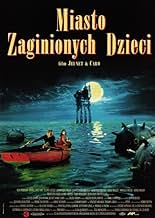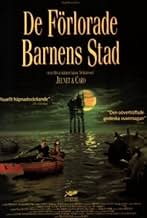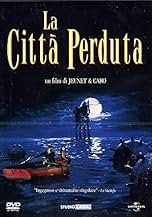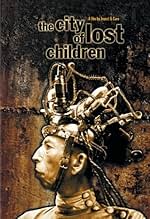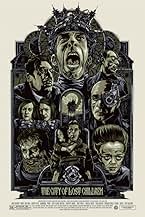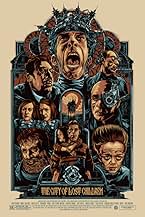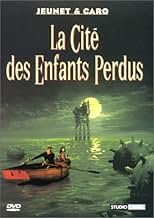PUNTUACIÓN EN IMDb
7,5/10
73 mil
TU PUNTUACIÓN
Un científico en una sociedad surrealista secuestra niños para robarles sus sueños, esperando que esto retrase su envejecimiento.Un científico en una sociedad surrealista secuestra niños para robarles sus sueños, esperando que esto retrase su envejecimiento.Un científico en una sociedad surrealista secuestra niños para robarles sus sueños, esperando que esto retrase su envejecimiento.
- Premios
- 5 premios y 14 nominaciones en total
Geneviève Brunet
- La Pieuvre
- (as Genevieve Brunet)
Mapi Galán
- Lune
- (as Mapi Galan)
Briac Barthélémy
- Bottle
- (as Briac Barthelemy)
Léo Rubion
- Jeannot
- (as Leo Rubion)
Argumento
¿Sabías que...?
- CuriosidadesTo achieve the slightly skewed color scheme of the movie, the actors were made up in white face and the color palette corrected until they were flesh-toned.
- PifiasThe words from The Original that Miette remembers in flashback (after she receives Uncle Irvin's dream message) differ slightly from what The Original actually said, although the point of the message is still the same.
- Versiones alternativasThere are two different audio tracks for the film - one is the original French language version and another is an English language dub.
- ConexionesFeatured in Les enfants de la cité perdue (1995)
- Banda sonoraWho Will Take Your Dreams Away
Music by Angelo Badalamenti
Lyrics by Marianne Faithfull
Performed by Marianne Faithfull
Reseña destacada
I can't help myself: I adore this film. I freely accept that it's not going to be everyone's cup of tea; if pushed, I might even accept that it's not perfect. But there's no film I love more, or more enjoy re-watching. One caveat though: I've seen both the subtitled and the dubbed print, and the English dubbing frankly comes close to ruining the movie. Ron Perlman dubs himself and is fine, and some of the other adult English actors are perfectly OK, though they tend to be blander than the French originals. But most of the children are terrible, and with her own voice it's Judith Vittet's extraordinary performance (all the more extraordinary considering she was nine at the time) that helps give "La Cité" the genuine emotional centre that some viewers don't feel it has.
But I'll come back to that. In any version, at least Jeunet and Caro's astonishing visual flair and artistry come over. I can't think of a film that has such a concentration of memorable shots - time and again, especially watching on DVD with a freeze-frame facility, you realize how many beautiful compositions Jean-Pierre Jeunet gives us: though the cast of characters could easily fill a freak show, and the sets are dark and quite unglamorous in themselves, the cinematography is gorgeous and the mise-en-scène often strangely elegant. It has a look all of its own, perfect for a modern, urban fairy-tale. The music too is gorgeous, one of the finest scores by David Lynch's regular musical collaborator, Angelo Badalamenti.
"Fairy tale" is I think the best generic starting-point for this film, so long as you think Grimm rather than Disney. (Unlike "Delicatessen", it isn't really a comedy, though it has comic elements). And the plot works according to its own logic, even if the progression from scene to scene is occasionally a bit lumpy or obscure. Krank (the astonishing Daniel Emilfork), grown prematurely old because he cannot dream, uses a cult of blind, messianic preachers to abduct children from a decaying industrial port and steal their dreams - but they have only nightmares, and Krank falls ever deeper into despair and evil. It's up to the orphan pickpocket Miette and a none-too-brainy circus strongman, One, to put a stop to him. This rich idea is elaborated with all sorts of visual conceits and eccentric characters - Jeunet mounts, for example, a couple of astonishing sequences in which chains of unlikely effects proceed from the smallest of causes - but never at the expense of the central relationship of One and Miette.
In a sense Miette, like Krank, has grown old too fast: the orphaned street-children of this city are savvy and unsentimental, and never seem to have had a childhood; meanwhile there's something deeply childish, in various ways, about most of the adults. Sensitively directed and never overacting, Judith Vittet's Miette gradually thaws, and Ron Perlman brings a lot of sympathy and pathos to what could have been an oafish, cartoonish role: Jeunet gives plenty of space and subtlety to their gradually-developing friendship, and dares to do what I suspect no English director would dare to do at the moment, which is to make their relationship innocently sexualized. Neither of them is really a grown-up, but it's still an extremely risky move, exploring the first stirrings of pre-pubescent sexuality while trying not to be exploitative or prurient. I do think the film pulls it off, though I can imagine some viewers feeling distinctly uncomfortable with it. For me it's one of the most convincingly unsentimental and nuanced (if mannered) portrayals of childhood I've ever seen on the screen, and there is real compassion and tenderness along the way, as well as some darker twists and turns.
It's a film that rewards analysis if you're prepared to surrender to its strange world with its strange rules. But it rewards the senses and the emotions too - and it radiates love of cinema as the perfect medium for sophisticated fantasy. One elderly actress who appears towards the end (Nane Germon) acted - as Jeunet's DVD commentary points out - in Jean Cocteau's "La Belle et la Bête" about fifty years earlier (there are, by the way, distinct references to the Beauty and the Beast story here), and "La Cité des enfants perdus" deserves to join that film as one of the classic cinematic fairy-tales. Pity about Marianne Faithfull over the closing credits, though!
But I'll come back to that. In any version, at least Jeunet and Caro's astonishing visual flair and artistry come over. I can't think of a film that has such a concentration of memorable shots - time and again, especially watching on DVD with a freeze-frame facility, you realize how many beautiful compositions Jean-Pierre Jeunet gives us: though the cast of characters could easily fill a freak show, and the sets are dark and quite unglamorous in themselves, the cinematography is gorgeous and the mise-en-scène often strangely elegant. It has a look all of its own, perfect for a modern, urban fairy-tale. The music too is gorgeous, one of the finest scores by David Lynch's regular musical collaborator, Angelo Badalamenti.
"Fairy tale" is I think the best generic starting-point for this film, so long as you think Grimm rather than Disney. (Unlike "Delicatessen", it isn't really a comedy, though it has comic elements). And the plot works according to its own logic, even if the progression from scene to scene is occasionally a bit lumpy or obscure. Krank (the astonishing Daniel Emilfork), grown prematurely old because he cannot dream, uses a cult of blind, messianic preachers to abduct children from a decaying industrial port and steal their dreams - but they have only nightmares, and Krank falls ever deeper into despair and evil. It's up to the orphan pickpocket Miette and a none-too-brainy circus strongman, One, to put a stop to him. This rich idea is elaborated with all sorts of visual conceits and eccentric characters - Jeunet mounts, for example, a couple of astonishing sequences in which chains of unlikely effects proceed from the smallest of causes - but never at the expense of the central relationship of One and Miette.
In a sense Miette, like Krank, has grown old too fast: the orphaned street-children of this city are savvy and unsentimental, and never seem to have had a childhood; meanwhile there's something deeply childish, in various ways, about most of the adults. Sensitively directed and never overacting, Judith Vittet's Miette gradually thaws, and Ron Perlman brings a lot of sympathy and pathos to what could have been an oafish, cartoonish role: Jeunet gives plenty of space and subtlety to their gradually-developing friendship, and dares to do what I suspect no English director would dare to do at the moment, which is to make their relationship innocently sexualized. Neither of them is really a grown-up, but it's still an extremely risky move, exploring the first stirrings of pre-pubescent sexuality while trying not to be exploitative or prurient. I do think the film pulls it off, though I can imagine some viewers feeling distinctly uncomfortable with it. For me it's one of the most convincingly unsentimental and nuanced (if mannered) portrayals of childhood I've ever seen on the screen, and there is real compassion and tenderness along the way, as well as some darker twists and turns.
It's a film that rewards analysis if you're prepared to surrender to its strange world with its strange rules. But it rewards the senses and the emotions too - and it radiates love of cinema as the perfect medium for sophisticated fantasy. One elderly actress who appears towards the end (Nane Germon) acted - as Jeunet's DVD commentary points out - in Jean Cocteau's "La Belle et la Bête" about fifty years earlier (there are, by the way, distinct references to the Beauty and the Beast story here), and "La Cité des enfants perdus" deserves to join that film as one of the classic cinematic fairy-tales. Pity about Marianne Faithfull over the closing credits, though!
- Jeremy-93
- 23 ene 2003
- Enlace permanente
Selecciones populares
Inicia sesión para calificar y añadir a tu lista para recibir recomendaciones personalizadas
Detalles
- Fecha de lanzamiento
- Países de origen
- Sitios oficiales
- Idiomas
- Títulos en diferentes países
- La ciutat dels nens perduts
- Localizaciones del rodaje
- Empresas productoras
- Ver más compañías en los créditos en IMDbPro
Taquilla
- Presupuesto
- 18.000.000 US$ (estimación)
- Recaudación en Estados Unidos y Canadá
- 1.738.611 US$
- Fin de semana de estreno en EE. UU. y Canadá
- 34.348 US$
- 17 dic 1995
- Recaudación en todo el mundo
- 1.783.616 US$
Contribuir a esta página
Sugerir un cambio o añadir el contenido que falta

Principal laguna de datos
By what name was La ciudad de los niños perdidos (1995) officially released in India in English?
Responde

